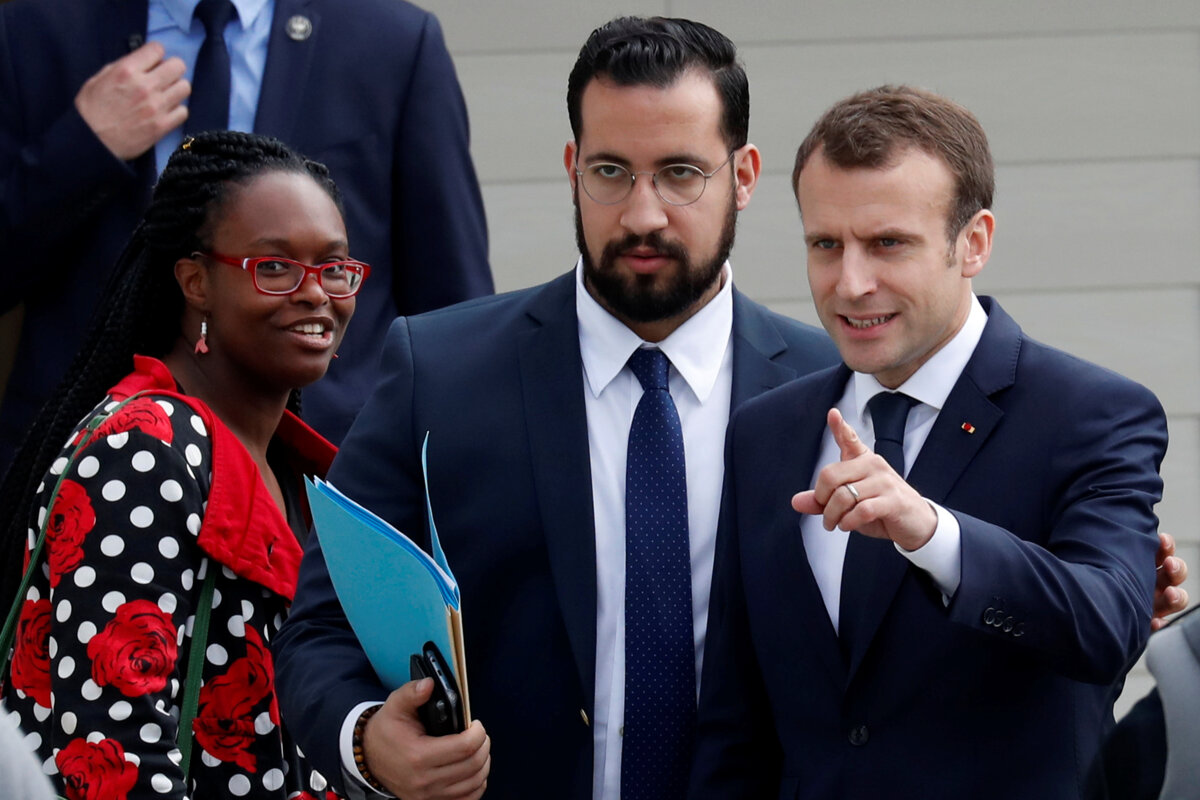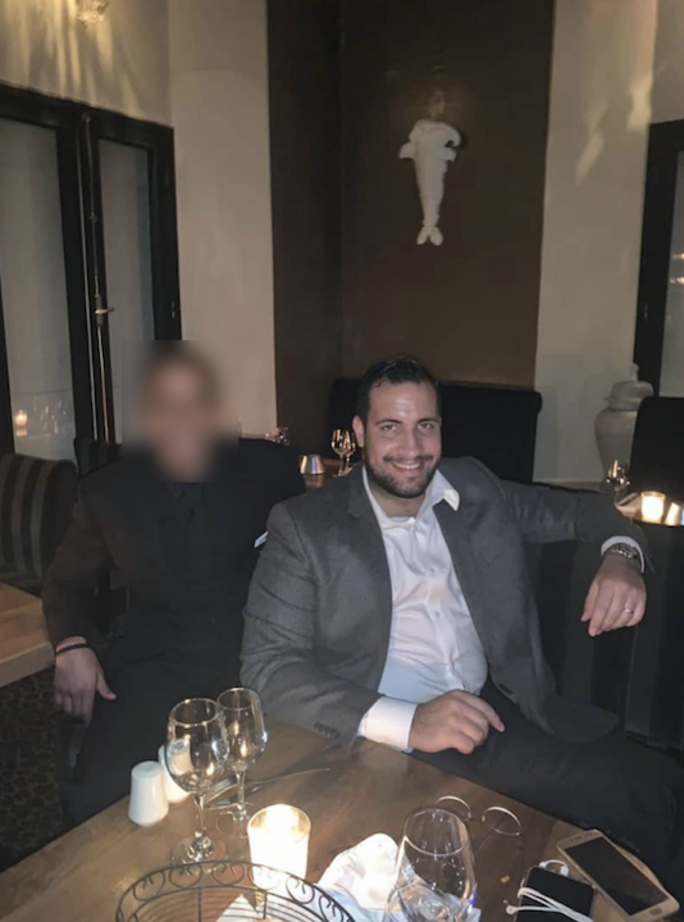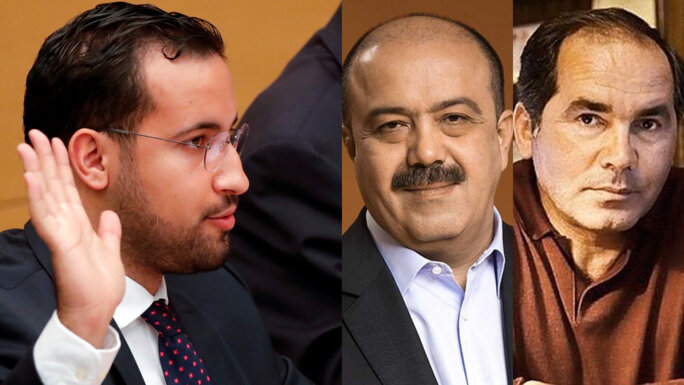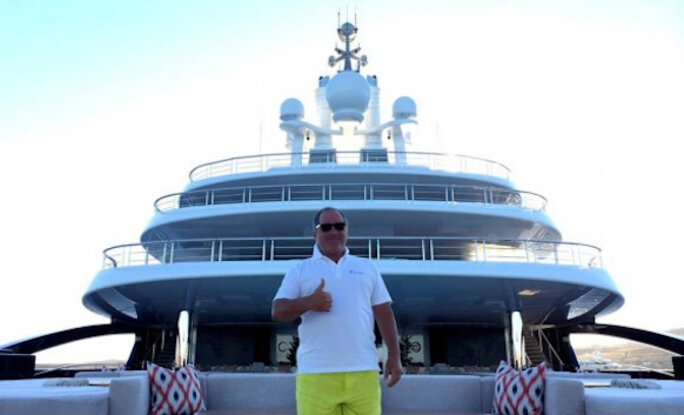While he was in post at the French presidential office, the Élysée Palace, Alexandre Benalla, whose job as security aide to President Emmanuel Macron and deputy to the president’s inner cabinet chief gave him access to confidential information, personally negotiated, from beginning to end, a contract for providing security services to Iskander Makhmudov, an oligarch with close ties to Russian president Vladimir Putin.

Enlargement : Illustration 1

His role in the negotiations for that first deal, worth 294,000 euros, was confirmed to Mediapart by former police officer Jean-Maurice Bernard, whose company Velours Sécurité was sub-contracted to work on the project. The negotiations, which began in early 2018, were held in a café close to the Élysée Palace, and also at the offices of Macron’s ruling La République en Marche (LREM) party.
Benalla, 27, was dismissed from his job at the Élysée last summer, following press revelations in July of how he had assaulted several people during disturbances at May Day marches in Paris earlier in the year while illegally wearing police insignia – he was officially accompanying crowd-control police as an “observer”.
Evidence strongly suggests that efforts were made to cover up the events, including the illegal obtention by Benalla and the Élysée, just hours after the revelations emerged on July 18th, of CCTV footage of crowd disturbances at the scene of the assaults in a vain attempt to justify Benalla’s violence. The judicial investigation into the May 1st events has uncovered mobile phone messages and signal records that indicate the footage may have been handed by Benalla to President Macron’s closest and most influential advisor, Ismaël Emelien, with whom he was in regular contact on the night of July 18th.
Emelien, 31, often described as the “brain” behind Macron’s election and subsequent policy decisions, announced his surprise resignation this week, citing his wish to join the “frontline” of public debate with the publication next month of a book he has written on political “progressivism”. The announcement that he is quitting his prestigious and powerful post came less than a fortnight after Mediapart revealed how Benalla, after he was dismissed by the Élysée, boasted of receiving Emelien‘s support, and even his advice on how to deal with the media (see bottom of page 2).
Since his dismissal, Benalla has continued with his deal-making for protection services, hidden behind a company called France Close Protection. Last October, the company completed a second deal, this time worth 980,000 euros, with Russian billionaire Iskander Makhmudov, whose fortune comes from mining and the metal industry. The contract is for the protection of Makhmudov’s family and entourage during their visits to France, and also the security of the oligarch’s several properties in the country. At least 300,000 euros of the total value of the deal was paid via a company in Monaco.
In December last year, when Benalla was also engaged in international travel to broker business deals while carrying French diplomatic passports he had failed to hand back to the Élysée, he signed a separate contract to provide security services to Farkhad Akhmedov, another Russian oligarch with ties to Putin. That contract was also for a total of 980,000 euros. More than 350,000 euros from that sum were initially paid in France, then swiftly transferred to Benalla via a company registered in Morocco.
In all, the deals signed between Macron’s former aide and the two oligarchs, completed variously before and after his dismissal from the Élysée, are worth a total of 2.2 million euros.
Meanwhile, over the two months since Mediapart first revealed Benalla’s dealings with the wealthy Russians – which has now prompted an investigation into corruption by France’s financial crime prosecution services – the French presidency, like also interior minister Christophe Castaner, has attempted to play down an affair that increasingly resembles a scandal of state. In an interview with radio station France Inter on February 10th, Castaner said the scandal surrounding Benalla “is not an affair of state”, but rather “the case of a fellow who has been involved in any old nonsense and who clearly continues to be involved in any old nonsense”.
Castaner was reacting to Mediapart’s revelations first published on January 31st (in English here) of compromising conversations, notably about the Russian contracts, between Benalla and his associate Vincent Crase, a former 'security and safety' manager for the LREM party, who had also lost his job after taking an active part with Benalla in the May Day assaults.
Following Mediapart’s disclosures of the conversations, and prompted by Prime Minister Édouard Philippe’s office, the Paris public prosecution services have opened an investigation into an alleged breach of personal privacy despite the fact that no-one has lodged a complaint of the sort.

Enlargement : Illustration 2

Immediately after that investigation was opened, the first move taken by Paris public prosecutor Rémy Heitz was a failed attempt on February 4th to carry out a search of Mediapart’s editorial offices in central Paris. The two public prosecution staff and three police officers sent to carry out the raid, were refused access to the premises on the grounds of the legal right of journalists to protect their sources.
The recorded conversations between Benalla and Crase, who are both placed under formal investigation in a separate probe into the May 1st violence, took place despite their conditional bail which barred them from meeting each other. But while Mediapart’s report showed that they had breached the terms of their bail, that also Benalla had lied under oath to a Senate hearing into his actions, notably on his dealings in the contracts with the Russians, he has been able to travel abroad unobstructed. He was notably seen last Friday enjoying an evening in a Moroccan cabaret venue, the Lotus Club, in Marrakesh (see photo above).
Mediapart’s continuing investigations have uncovered further details, presented here, about the secret dealings of Benalla and Crase, and which raise yet more disturbing questions about Benalla’s actions while employed by the Élysée and the relative impunity he has enjoyed since his dismissal.
- Benalla’s secret negotiations while in post at the Élysée
In early 2018, the management of French private security company Velours Sécurité, for which Alexandre Benalla had once worked, received a New Year’s greeting card from the French presidency personally signed by the young man. The card was something of a surprise, for Benalla had left the company in 2015.
Several weeks later, Benalla, who was then a special security aide to Emmanuel Macron with the title of deputy to the chief of the president’s inner cabinet, phoned Maurice Bernard, head of Velours and a former police officer with the elite BRI “anti-gang” squad. Benalla informed Bernard about the possibility of doing a deal with “a friend”, and a meeting was organised between the two men for mid-March at the Damas Café, a hukkah bar close to the Élysée Palace where Benalla was a regular.
Benalla arrived at the meeting in the company of Vincent Crase, then a 'security and safety' manager for Macron’s LREM party who had access to the Élysée as a gendarmerie reservist. Crase himself ran a small security company called Mars. Benalla explained to Bernard that the contract he had alluded to on the phone involved ensuring the security in France for a wealthy foreign family.
In fact, it was that of Uzbek-born oligarch Iskander Makhmudov who owns several properties in France. Makhmudov, 55, who enjoys close links to Russian president Vladimir Putin, has been cited in investigations in Spain and Germany as suspected of links to Russian organised crime gangs.
As Mediapart has previously reported, French businessman Jean-Louis Haguenauer, who acts as Makhmudov’s representative in France, served as an intermediary in the deal, meeting with Benalla on several occasions. Haguenauer told Mediapart that Vincent Crase had been designated by Alexandre Benalla to implement the contract.
On March 22nd, Velours sent a commercial proposition to Crase by email in which there was no specific detail about the family to be protected. By June, the discussions had advanced and a number of meetings were held at the Damas Café. But, according to sources with knowledge of the negotiations, Velours was also talking directly to Vincent Crase in meetings with him at the LREM party headquarters in Paris between June 15th and 25th.

Enlargement : Illustration 3

Benalla finally came up with the names of several security agents to make up the team for the contract. There were to be seven operatives, all with military backgrounds, working on 15-day shifts. Three were from the 1st RPIMa French parachute regiment in Bayonne, south-west France; Jean-Noël B., Thierry H-L. and Jérôme R. were given short-term contracts by Velours. Two former navy servicemen, Jean-Marc F. and Michael A., were also recruited. Yoann Petit, a former reservist with the 92nd infantry regiment in Clermoint-Ferrand also joined the team.
Finally, just before the beginning of the mission, another meeting was held at the Damas Café to recruit Choukri Wakrim, a member of a French special forces group. Wakrim, the partner of the head of the French prime minister’s security service (she last week resigned her post), had, according to informed sources, taken unpaid leave and placed an official request to quit the army.
Velours prepared a seventh contract for Reynald Chevallier, a member of the LREM party’s staff known to Benalla, who presented him as also working as a “sports coach” at the Élysée. However, at the last minute, Chevallier decided not to join the team.
With a team established, a sub-contracting agreement was signed between Vincent Crase’s company Mars and Velours on June 25th, and three days later the security mission began. In the event, the size of the team was way more than required for the initial project, which involved ensuring the security of Iskander Makhmudov’s partner and their seven-year-old triplets during their stay in France. Makhmudov himself never arrived in the country during the period of the operation.
The contract set out quarterly payments by the oligarch of 294,000 euros, and the first instalment was transferred on June 28th 2018 into an account belonging to Crase’s company Mars at the Société Générale bank. Of that sum, 172,200 euros was transferred to Velours on July 6th 2018. Velours looked after the remuneration of the team members (who were paid monthly net sums that varied between 2,500-4,500 euros), and also the expenses incurred. Velours claims its net profit from the deal was less than 15% of the total received from the contract. Mars, however, reaped a commission of 122,000 euros, representing 40ù of the value of the contract.
Just what justified such a handsome amount is unclear. Neither Vincent Crase nor Alexandre Benalla accepted to answer questions submitted to them by Mediapart.
All went well until July 18th 2018, when French daily Le Monde was the first to reveal video evidence of Crase and Benalla assaulting several individuals on the sidelines of that year’s May Day marches. Officially, the pair were accompanying police units involved in crowd-control operations that May 1st as “observers” of policing, but they were caught on several videos assaulting and arresting people in two locations in Paris, illegally dressed with police insignia. Following the revelations, a judicial investigation was opened on July 22nd, when the two men were formally placed under investigation over the assaults. As a result, Velours decided to renounce any further involvement in the Russian contract, which it signified to its former partners in a recorded-delivery letter.
Meanwhile, a special department of the Société Générale bank responsible for monitoring transactions that represented a potential risk of illegal practices, was suspicious of the payment into the Mars account on June 28th. The bank, whose curiosity was aroused by the size of the payment and its provenance – an account in Monaco, a tax haven – demanded to see a copy of the contract it related to.
Crase and Benalla were given conditional bail after being formally placed under investigation for the May Day assaults, which included the order that they should not have any further contact with each other pending the results of the judicial probe. But despite that, the two men met for an urgent meeting on July 26th, as revealed by Mediapart in published sound recordings of their conversation that day.
In the exchange, Benalla told Crase that, “We have to cut the branch”, and slammed his business partners. ““Velours [...] they're going to fuck themselves up, I don't give a shit,” he says in the recording. Vincent Crase adds: “I don't much like rats who leave the ship.”
“We have to change the set up, we have to do what we'd planned to do and and transfer … […] You have to disappear from the company,” Benalla said to Crase. “[...] So we need to find a guy […] in the end I've got an idea in mind, but we must put the company in another guy's name. Because if not […] they're going to carry out a preventive seizure and they'll put a stop to the company [...]” he added.
According to information received by Mediapart, Benalla went to the offices of Velours, firstly in August, and then again in September, in a bid to secure their silence about the contract. In a recent interview with Mediapart, the head and founder of Velours, Jean-Maurice Bernard commented: “The facts are there. There is just one reality, which is as simple as it is unquestionable; Alexander Benalla asked us not to break off the contract linking us with Mars. A contract for which he sought our involvement. A contract for which he took part in the negotiations. A contract in which he suggested the names.”
Bernard said he wanted “each person to assume their responsibilities”, adding: “For my part, I have nothing to hide. I have nothing to reproach myself over, other than having anticipated the betrayal which we were going to become the victims of.”
Meanwhile, during the same meeting between Benalla and Crase on July 26th 2018, Benalla claimed he had the backing of the Élysée. When Crase asked him from who exactly the support was from, Benalla immediately answered: “From the president, Madame [editor's note, Brigitte Macron], Ismaël [Emmanuel Macron’s most senior advisor Ismaël Emelien] who is advising me on the media.”
Contacted by Mediapart for comment on the claim, Emelien, who this week announced his resignation as advisor to Macron, did not respond. The Élysée meanwhile denied the suggestion that Emelien had guided Benalla in his public relations strategy.
II. Russian dolls
Apparently believing that he had successfully hidden the Makhmudov contract from the police and judicial investigations, Benalla took part in creating a new company – France Close Protection – which was intended to receive future payments from the oligarch. While Benalla’s name appears nowhere in the company’s official papers, there is ample evidence of his involvement in it.
France Close Protection is officially managed by Yoann Petit, 44, a former French army soldier who had worked on the Russian contract for Velours.
Petit did not reply to Mediapart’s request for an interview. His company has just one shareholder, an 18-year-old man who resides in Normandy, northern France, which is also where both Benalla and Crase come from.
The company statutes of France Close Protection, which declares its mission as providing “protection” for individuals in France and abroad, and also “advising” on business affairs, were registered on October 2nd 2018. One week later, Crase closed the bank account in the name of his company, Mars.

Enlargement : Illustration 4

Mediapart has obtained documents that confirm without any doubt that France Close Protection is in fact a structure through which Benalla and his colleagues intended to continue their dealings with Iskander Makhmudov.
In a new contract that was drawn up, it again centred on providing the security of Iskander Makhmudov and his entourage, and notably the oligarch’s children. It details the provision of close personal protection, surveillance and security escorts both in France and abroad. Several security agents are appointed, including a chauffeur who, apart from providing for the safety and comfort of the Makhmudov family during their travels, must ensure the constant availability of equipment to deal with emergencies – and also the presence of a defibrillator.
Under the contract, the close guard provided to Makhmudov must carry out pre-inspections on places to be visited by the oligarch, to identify potential threats to his safety, and to ensure his safe passage through airports when necessary.
On the financial side, Makhmudov’s interests are represented by a company called Gaia Monte Carlo 2015 based in Monaco, where Makhmudov placed the management of all his assets in France at the beginning of 2018. Until then, the companies that managed his French properties, which include a château in Sologne, in north-central France, hunting grounds and a villa in Ramatuelle, on the Riviera, were all registered in France – although they were funded by loans transferred from offshore accounts in Cyprus.
Gaia Monte Carlo 2015 is managed by Ian A. Lubcke, whose name already appeared in Makhmudov’s structures in France. According to information received by Mediapart, Lubcke deals directly with Benalla concerning the implementation of the contract.
The total value of the new contract amounts to 980,000 euros, before taxes, and out of this a sum of 294,000 euros was paid to France Close Protection in October 2018. France Close Protection then paid Benalla, in November and December last year, according to the visible records of his remunerations, several tens of thousands of euros.
Testifying before the French Senate’s commission of inquiry launched last year into his role and activities at the Élysée, Benalla refused to detail what those payments to him by France Close Protection related to. In the light of Mediapart’s investigations, the probable reason for his silence now appears to be that he was paid under a contract with Iskander Makhmudov which was initiated at a time when Benalla, by the nature of the post he then occupied at the Élysée and by his personal relationship with President Macron, was the recipient of, and had access to, confidential information from within the French presidential office.
III. Expanding business to a second Russian oligarch
Last November, Emmanuel Macron gave an interview to French radio station Europe 1 when, referring to the May Day assaults, he called for “allowances” to be made regarding the “faults” committed by Benalla. Several days later, Benalla negotiated another contract on behalf of France Close Protection, this time with another Russian billionaire, Farkhad Akhmedov.
The contract was signed on December 2nd 2018. It provided for the protection of the oligarch and his children during their visits to France, Switzerland and several other European countries, and also the services of a chauffeur, five security operatives and a mission leader. The value of the contract was 980,000 euros before taxes.
Shortly after the signature, a first payment of 353,000 euros was made to France Close Protection, which in turn was transferred to the account of a Moroccan company called Instra Conseil, created on November 2nd 2018 and registered in Marrakesh. Its beneficial owner is Alexandre Benalla. According to the company’s statutes, a document signed by Benalla, Instra Conseil provides “security advice” and “training”.
Farkhad Akhmedov, like Iskander Makhmudov, is described by media reports as having close ties to the Kremlin. In January 2018, his name appeared on a so-called “Putin list” issued by the US treasury which named 210 Russian politicians and oligarchs who could be targeted as part of sanctions that Washington envisaged in connection with Moscow’s alleged interference in the 2016 US presidential elections, and its military intervention in Ukraine.

In a March 2018 report by Russia’s TASS news agency, Akhmedov, was quoted as telling the country’s RBS media group: "I am the first Russian businessmen to contest the so-called Kremlin list. So far, the list has been copied from the Forbes magazine, but in any case I will be upholding my honour and reputation in an American court.”
Akhmedov, 63, who is of Azerbaijani origin, amassed most of his fortune, estimated by Forbes magazine at 1.4 billion dollars (about 1.24 billion euros), through his stake in Russia’s gas and oil giant Northgas, which he sold up in 2012. Between 2004 and 2010, he served as a senator in the Russian Federation Council.
His bitter, high-profile divorce in London revealed the extent of his assets, which include luxury villas (one at Saint-Jean-Cap-Ferrat on the French riviera), helicopters, the second-largest private yacht in the world (the Dubai-based Luna, bought from fellow oligarch Roman Abramovich), and a modern art collection.
Replying to Mediapart via his spokesman, Akhmedov did not deny the contract with France Close Protection but instead said he had “no comment” to make about it. He also did not deny his reported closeness to the Kremlin, but said he had not been targeted by US sanctions.
-------------------------
If you have information of public interest you would like to pass on to Mediapart for investigation you can contact us at this email address: enquete@mediapart.fr. If you wish to send us documents for our scrutiny via our highly secure platform please go to https://www.frenchleaks.fr/ which is presented in both English and French.
------------------------------------------------------------------------------
- The French version of this report can be found here.
English version by Graham Tearse


